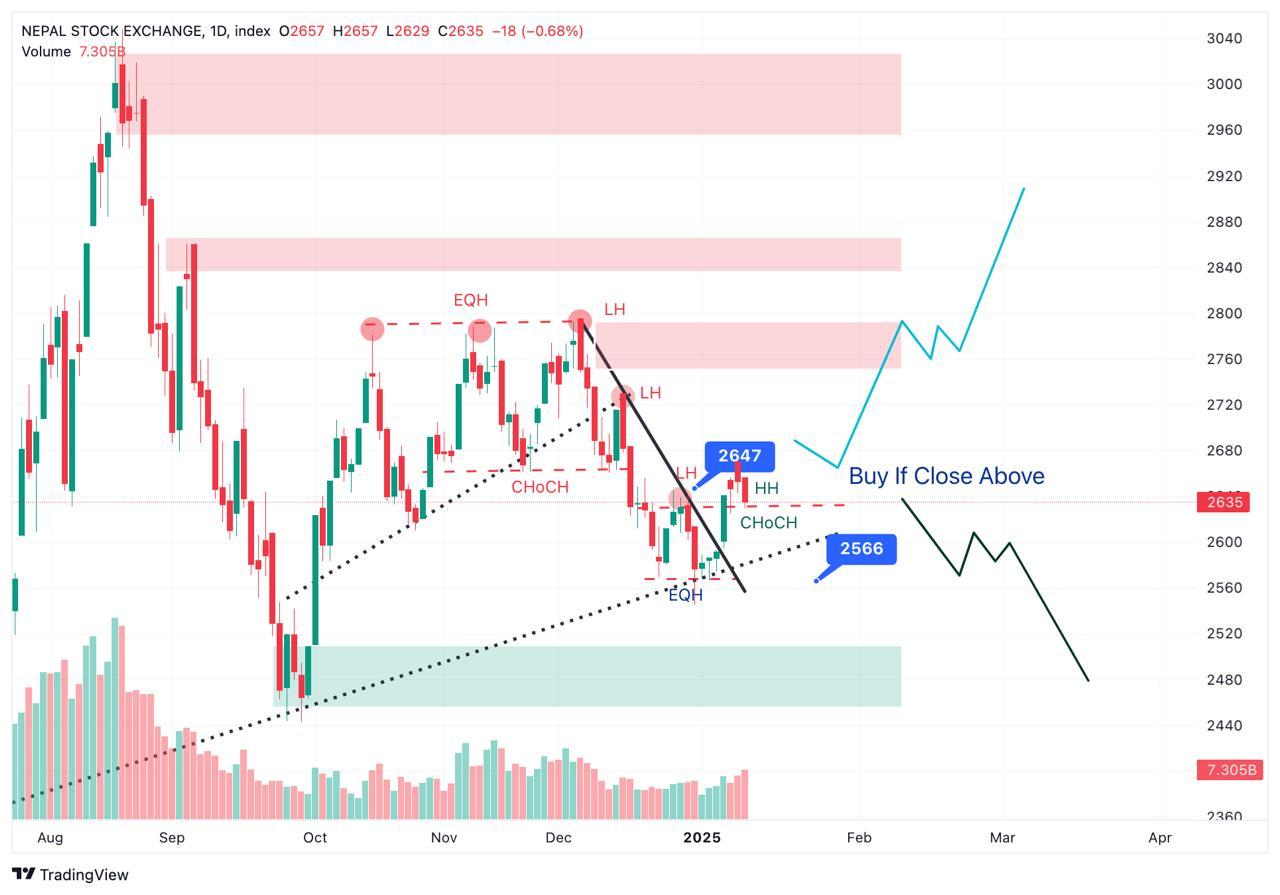NEPSE Declines by 18 Points After 6 Consecutive Days of Gains; Traders' Dominance Observed; Investors Hopeful for Market Surge in Magh
Author
Dipesh Ghimire

After six consecutive days of green, NEPSE saw a correction on Thursday, the last trading day of the week. The NEPSE index declined by 18.14 points, closing at 2635.09. However, trading volume surged to over NPR 7.3 billion, marking a significant increase during this period. Except for the Hotel and Tourism sector, all other sub-indices declined. Over 157 million shares of 308 companies were traded during the day.
Some analysts attributed the market's decline to the pressure of the end of the Nepali month of Poush, while others believed it was due to traders booking profits. It was noted that Thursday was the final opportunity for investors to sell shares and have the proceeds credited to their accounts in time, given the T+2 settlement process. Since the market is closed on Friday and Saturday, shares sold on Sunday would not yield funds in accounts until Monday, the last day of Poush. Brokers suggested that this selling pressure was due to the need to clear loan principal and interest by the end of the month.
As Magh approaches, investors anticipate the release of second-quarter financial reports, which could inject fresh energy into the market if average profitability shows positive results. Increased purchasing power and reduced selling pressure are expected. Analysts also predict that the announcement of new interest rates by banks for Magh could add to market dynamism.
When NEPSE rises steadily, investor morale tends to be high, whereas participation drops during corrections — a characteristic of the Nepali stock market. Experts predict that the overall trend is now moving toward a bull run, as the market has shown bullish signals after nearly six months of sideways movement. Despite minor corrections, the market is believed to have the potential to maintain an upward trajectory, having rebounded from the 1800 level.
Analysts suggest adopting strategies that focus on long-term investments in fundamentally strong companies, which offer both dividend and capital gains. The current market pressure presents an opportunity for investors to rethink and refine their strategies. The latest correction is expected to clear short-term pressures, paving the way for long-term growth potential.
Technical Analysis
Technical analysts have noted that the correction seen in today's market was minor and expected after six consecutive days of growth. While some traders took profits, the market showed no significant technical reaction. Several indicators had already signaled a "buy" prior to today's session, and the decline did not impact technical metrics.
Broker Analysis
An analysis of the top 10 brokers based on trading volume shows that five brokers were more active on the buying side, while the other five were focused on selling. Broker No. 65 had the highest trading volume, with NPR 483.8 million in buying and NPR 700.4 million in selling. Similarly, Broker No. 58 bought NPR 296.3 million worth of shares and sold NPR 480 million. Broker No. 72 recorded NPR 300 million in buying and NPR 250 million in selling, while Broker No. 49 bought NPR 250 million and sold NPR 270 million.
In terms of specific stocks, Broker No. 65 dominated the buying of Super Madi Hydropower, accounting for 79.47% (234,000 shares). Broker No. 49 accounted for 36.47% (101,000 shares) of Himalayan Urja Bikash shares. Additionally, Broker No. 56 purchased 83% of Chilime Hydropower shares, while Broker No. 58 accounted for 40% of Rasuwagadhi Hydropower shares.
The market correction today highlights short-term pressures but also reinforces the potential for long-term stability and growth.



